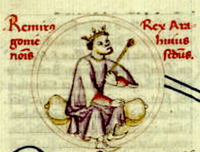Ramiro II of Aragon
| Ramiro II | |
|---|---|

Ramiro II from the 15th-century Genealogies dels comtes de Barcelona
|
|
| King of Aragon | |
| Reign | 1134–1137/1157 |
| Predecessor | Alfonso I |
| Successor | Petronilla |
| Born | 24 April 1086 |
| Died | 16 August 1157 (aged 71) Huesca |
| Burial | Abbey of San Pedro el Viejo |
| Consort | Agnes of Aquitaine |
| Issue | Petronilla of Aragon |
| House | House of Jiménez |
| Father | Sancho Ramírez |
| Mother | Felicia of Roucy |
| Religion | Roman Catholicism |
| Signature |  |
Ramiro II (24 April 1086 – 16 August 1157), called the Monk, was King of Aragon from 1134 until withdrawing from public life in 1137 (although he used the royal title until his death). He was the youngest son of Sancho Ramírez, King of Aragon and Navarre and Felicia of Roucy.
His father had placed him as a child into the Benedictine monastery of Saint Pons de Thomières in the Viscounty of Béziers. As a respected monk there he was elected abbot of the Castillian royal monastery of Santos Fecundo y Primitivo in Sahagún and later was abbot of the monastery of San Pedro el Viejo at Huesca. Wanting to limit Ramiro's power within the Kingdom of Navarre-Aragon, his brother Alfonso the Battler had blocked his elections as bishop of Burgos and as bishop of Pamplona. In 1134 he had been elected bishop of Barbastro-Roda when the death of his childless brother made him one of the candidates for succession to the crown. Others put forward included Alfonso VII, king of Castile, who as a foreign king found little support, and the choice of the Navarrese nobility, Pedro de Atarés, grandson of Sancho Ramírez, Count of Ribagorza, the illegitimate son of Ramiro I of Aragon. At an assembly at Borja intended to resolve the succession, a misunderstanding alienated Pedro from his supporters, yet they were unwilling to accept the Aragonese-favored Ramiro, and in the end the kingdoms were divided. In Navarre, García Ramírez, a scion of the pre-union royal family of Navarre and protégé of Alfonso VII was chosen king, while in Aragon the choice fell on Ramiro, who suspended his monastic vows to take the crown.
...
Wikipedia
